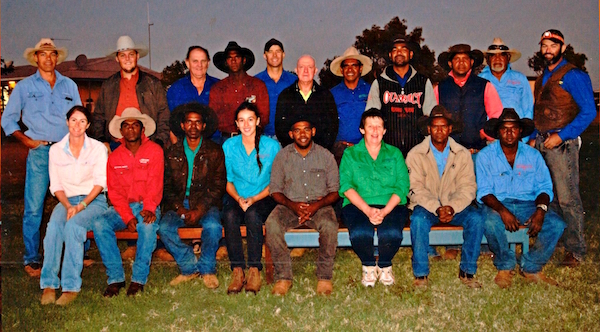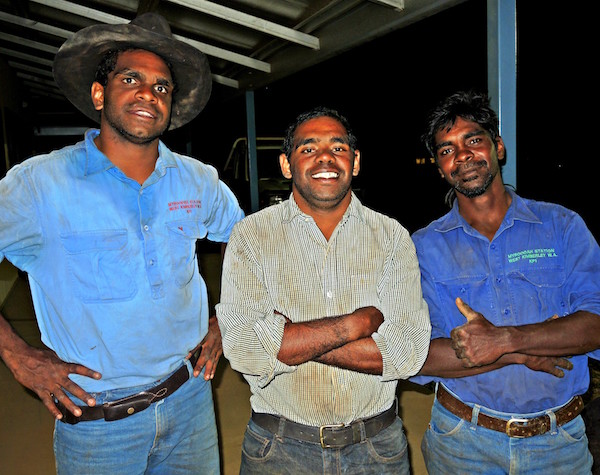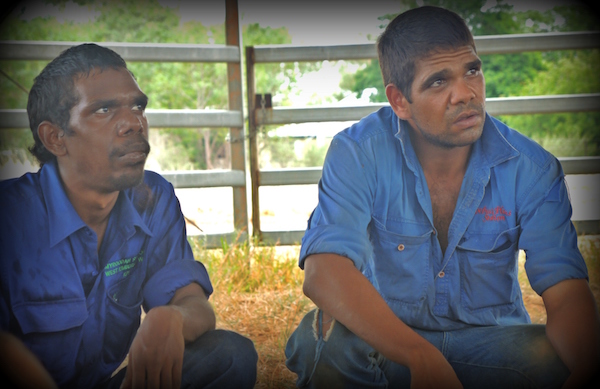A team through adversity
Host: Myroodah Station
Written by Pam Daniell – Manager, Myroodah Station.
“Don’t judge my path, if you haven’t walked my journey”.
At Myroodah Station there is a staff notice board which includes an ever-changing “quote of the week”. The above citation has been previously displayed there.
When my husband and I took on a management role five years ago working for the Indigenous Land Corporation, I thought we’d be running just another cattle station with a bit of indigenous skills training on the side. How grossly I’d underestimated what I’d go on to learn, and the deep sense of empathy I would develop for the plight of so many Indigenous Australians.
Even as I begin this report, a strong surge of emotion threatens to surface as I recall some of the appalling and tragic situations experienced just within our own circle of staff. Sadly, I now know many of these circumstances are all too commonplace for countless Indigenous Australians.
Swing your focus up to the north of Australia and you hear of the many initiatives that are designed to provide more suitable outcomes for our Indigenous people across the Top End. Multiple organisations have implemented wonderful programs that really are making a difference to people who desperately are in need of a “hand up” not a “hand out”.
On Myroodah Station, with our staff being predominantly indigenous employees, we see our fair share of young (and not so young) men and women “having a go” . . . I tip my hat to those who just turn up every day at 5am ready to work with big smiles on their faces. I’ve learnt over the past five years so much more about what they’ve actually endured to arrive at this destination.
We’ve also come to realise that indigenous staff like to work here because they are the majority rather than the minority, which unfortunately tends to be the case in many workplaces. Due to the remote nature of a lot of communities, employment options can be very limiting. Many indigenous people are now brought up in communities where high unemployment prevails.
Our staff suffer the loss of friends and family quite close to them on a regular basis due to a myriad of issues including poor health, and substance abuse, which are big problems in many indigenous communities. Leave required by staff to attend funerals is a frequent occurance.
During our time here several of our staff members have required monthly visits to the local medical clinic for a shot of penicillin to keep their rheumatic fever in check. This disease is rare in Australia except for remote parts of central and northern Australia where Aboriginal and Torres Strait Islander people, especially children, are at increased risk. Rates in Australia’s northern indigenous communities are apparently among the highest in the world.
Whilst the standard of work we expect is high, we also try to foster a strong team environment where everyone has respect for each other, consideration for others and confidence in themselves. When you better understand the challenging path that many of our staff have travelled, you can see the value in providing a workplace that encourages these attributes.
Communication is fundamental so we have introduced monthly staff meetings where everyone is given the opportunity to freely discuss anything that concerns them. We talk about the upcoming work program and staff advise us of approaching funeral dates or other events they need to attend so we can work the program around being short of staff for a day or two.
Another initiative helping to boost self-esteem and team morale is anonymously voting for an ‘Employee of the Month’ during our meetings. The recipient receives a prize, a big round of applause, and their photo is displayed on the notice board for the following month.
Numeracy and Literacy training is also delivered every three weeks by the local Kimberley Training Institute for several hours of a morning. We love being able to offer training and education to our staff as it clearly promotes self-confidence and personal growth, and our staff genuinely value and look forward to these sessions.
Another hurdle we face every year is having enough licenced drivers to operate our vehicles. This situation arises because often staff arrive at Myroodah with disqualified licenses. We support them in submitting an application for an Extraordinary Licence, then get them to court, then go through the licensing requirements if deemed acceptable by the magistrate. At the end of this drawn out process, however, we have another worker licenced to drive on Myroodah, and another valued staff member with an opportunity to accept more responsibility and grow in confidence and self-worth.
Now this may sound like a whole lot of effort to employ and retain staff to run a cattle business. But please allow me tell you what we get out of it all. It is very satisfying when visitors to the station comment on the confidence of our indigenous staff, understood just through a hand shake and a little eye contact. Or when truck drivers turn up to load our cattle and remark on how well the cattle flow through the yard with the low stress stock-handling techniques employed by our staff. Or when our staff compete in a local campdraft and are noted for their fantastic horsemanship skills, or simply when I ask an employee how their day has gone and they declare that “every day is a great day out here”. They make me so proud and I know we get to see the very best of them here. The paths our employees have travelled upon to arrive at this destination are rarely smooth . . . but with the whole team pulling together on Myroodah Station, and the constant backing and support of the Indigenous Land Corporation, I believe that something special is happening here. I feel privileged to have been a part of it and to have crossed paths with these amazing fellas.
 Myroodah Station staff and helicopter pilots 2016.
Myroodah Station staff and helicopter pilots 2016.




